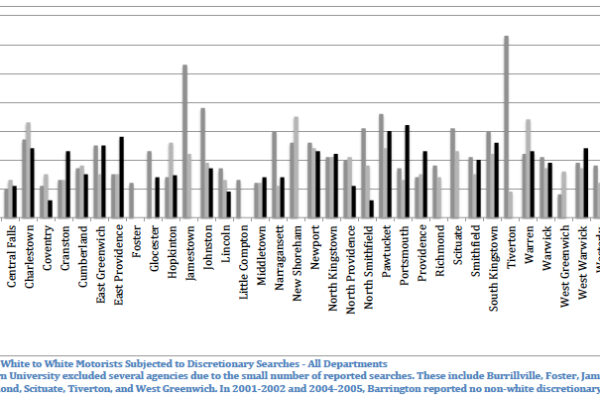As part of an ongoing analysis of racial disparities in Rhode Island, the ACLU of Rhode Island today announced that racial disparities in searches during motor vehicle stops appear to be increasing.
In 2003, 2006, and 2014, Northeastern University released three separate studies analyzing racial disparities in traffic stops and searches made by each of Rhode Island’s police departments. The data released today by the ACLU compared rates of what are called “discretionary searches,” or all searches that are not incident to arrest. This most recent analysis indicates that the racial disparities in discretionary searches are not only continuing, but in many cases increasing. Of the ten Rhode Island police departments that stopped more than 2,000 individuals and/or engaged in more than 100 discretionary searches in 2004 and 2005, the data indicates that nine have seen a subsequent increase in the racial disparity of such searches.
Of the ten, the police departments that have seen an increase in search disparity since 2001-2002 include Cranston, East Providence, North Kingstown, Providence, Woonsocket and the State Police. Although not as extreme as their earlier disparities, Pawtucket and South Kingstown have increased their racial disparities since 2004-2005. (Click each chart to enlarge)
In addition, of the departments with sufficient data for all three studies, virtually all police departments in Rhode Island search non-white drivers at rates disproportionately higher than white drivers.
Hillary Davis, ACLU of Rhode Island policy associate stated: “Ten years since racial profiling was prohibited by law, this data is both alarming and disheartening. Black and Hispanic drivers remain disproportionately searched by law enforcement, even though Northeastern University’s analysis demonstrates that white drivers are more likely to be found with contraband when searched. As a result, these searches are both discriminatory and ineffective. A decade’s worth of conversations between law enforcement and the community have not resolved these disparities, and it is time for law enforcement to employ new means to ensure Rhode Islanders receive equal treatment in their interactions with the police.”
This analysis comes as part of a forthcoming larger analysis of racial disparities across Rhode Island, including in arrest rates and school suspension rates.

